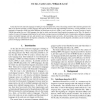Free Online Productivity Tools
i2Speak
i2Symbol
i2OCR
iTex2Img
iWeb2Print
iWeb2Shot
i2Type
iPdf2Split
iPdf2Merge
i2Bopomofo
i2Arabic
i2Style
i2Image
i2PDF
iLatex2Rtf
Sci2ools
109
click to vote
LREC
2010
2010
The Problems of Language Identification within Hugely Multilingual Data Sets
As the data for more and more languages is finding its way into digital form, with an increasing amount of this data being posted to the Web, it has become possible to collect language data from the Web and create large multilingual resources, covering hundreds or even thousands of languages. ODIN, the Online Database of INterlinear text (Lewis, 2006), is such a resource. It currently consists of nearly 200,000 data points for over 1,000 languages, the data for which was harvested from linguistic documents on the Web. We identify a number of issues with language identification for such broad-coverage resources including the lack of training data, ambiguous language names, incomplete language code sets, and incorrect uses of language names and codes. After providing a short overview of existing language code sets maintained by the linguistic community, we discuss what linguists and the linguistic community can do to make the process of language identification easier.
| Added | 29 Oct 2010 |
| Updated | 29 Oct 2010 |
| Type | Conference |
| Year | 2010 |
| Where | LREC |
| Authors | Fei Xia, Carrie Lewis, William D. Lewis |
Comments (0)

